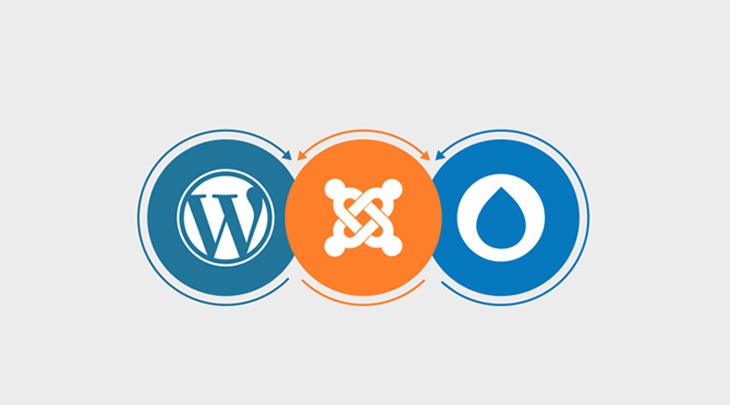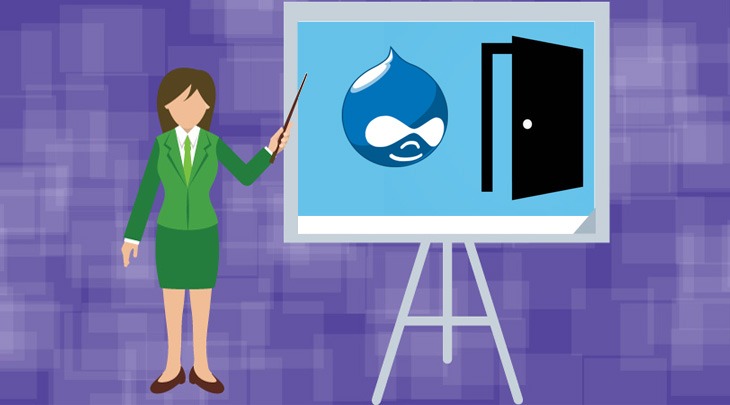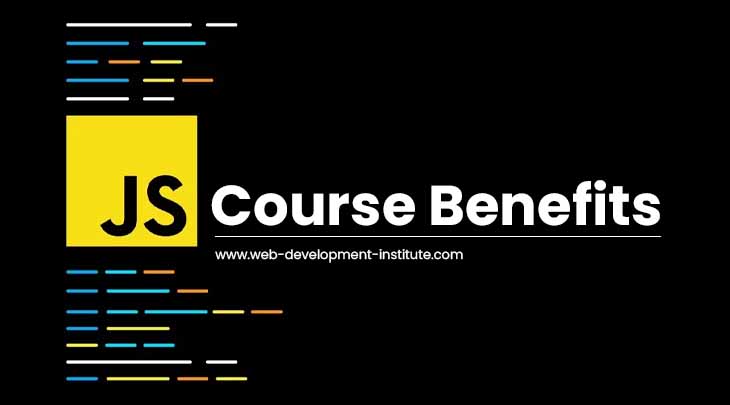As the competition is increasing in various industries the demand of business promotion is also at the high rates. Website is one of the best options for people to promote the products and services which they are providing as it is more economical than any other advertising methods. A website is a 24×7 window for advertisements for a company or organization.
Everyone wants a website that can be easily maintained and managed without any help of programming to control the expense over advertisements. The Content Management System (CMS) allows you to manage and maintain website. Anything like uploading videos, images, blogs, adding new pages and other major changes can be done very easily. There are main 3 players (CMS platforms) known as WordPress, Joomla and Drupal. All these CMS are built using PHP, HTML, CSS, JavaScript etc.
These are the most popular frameworks and globally used CMS. Although these all are website’s CMS and used to built a dynamic and rich featured website but there are lots of dissimilarities among these.
Let me introduce you to these first.
WordPress

WordPress is an open source platform where you can create beautiful websites, blogs and apps. Its history was started in 2003 withfewer users those can be count on fingers. It was developed with single bit of code by and for community. At its initial starting point it was just a blogging system but since then it has evolved to work as a complete Content Management System. Around 29% of Web is using WordPress. You are free to create attractive designs, powerful features, and anything that you want. It is totally free for all. Your skill level doesn’t matter, there’s new opportunities for all.
Powerful Features of WordPress

- Easy and convenient
- Customizable Designs
- SEO Friendly
- High Performance
- Responsive Sites
- Completely Secure
- Well Built Media Management
- Manageable Mobile Apps
To know a bit more about WordPress check out this page: www.wordpress.org/about/
Joomla

Our next player is Joomla which is well known for its brilliant performance. Joomla is a flexible platform that empowers website developers. You can built any type of websites, app or portals using Joomla. It was released in 2005. The hard work and immense efforts of thousands of people made it a well likes, easy, secure and stable CMS. More than 3%of Web uses Joomla. You can customize your site in any way you want with the help of thousands of free templates and extensions available in it. It is a multilingual CMS that is offering around 70 languages. All these efforts have done by Joomla to enhance your web designing skills.
Powerful Features of Joomla

- Free for all
- Search Engine Optimization Friendly
- A Multilingual CMS
- Flexible
- Cache Management
- Menu Management
- User Management
- Fully Extensible
- Multi-User Permission
- Mobile Friendly
- Unlimited Designs
Drupal

One of the popular CMS of the world is Drupal. It’s used to create many of the websites and web applications people use every day. Drupal is consists of thousand of great standard features, like easy content management, excellent performance and security. Its core principles which are flexibility and modularity helps to built the dynamic, versatile and multi-skilled web experience. It is totally free, you can download, work on and share it with others.
Powerful Features of Drupal

- SEO chummy
- Infinite advance features
- Available in 100 Language
- Completely Flexible
- Responsively Designed Themes
- Multiple Users Authorization
Although these all are website CMS and used to built a dynamic and rich featured websites and other web applications but there are lots of dissimilarities among these.
Let us have a brief overview on the differences between the three CMS.
| Basis | WordPress | Joomla | Drupal |
|---|---|---|---|
| No. of Websites | Almost 75 million sites are running on WordPress and 37 million websites have hosted on free of cost at Word Press.org. | 2.8 million sites are organizing by Joomla. | Around 1.1 million sites are running on Drupal. |
| Easy to Utilize | It is very easy to manage without having any programming knowledge. | It is little bit tough to handle if you are non-prgrammer. | It needs good developing skills to utilize its functions. |
| Level of Knowledge Require | Programming knowledge is not require. Best for non-programmers. | It requires little programming skills. | It needs most programming skills of the three CMSs. However is able to build the most advance websites. The more you work on Drupal the more you like it |
| No. of Plugins | It has around 53,232 thousands plugins which are highest in all CMS paltforms. That is what makes it very popular. | Over 7,994 thousands of plugins which are of great variety and advance functionality in Joomla . | It has almost 39,244 plugins. |
| No. of Themes | Highest 3000+ themes. | Almost 1000+ themes. | There are around 2000+ themes available at the Drupal. |
| Complexity | Easy to handcle for both non-programmers and programmers. | It needs little knowledge of coding. We can say that it is more complex than WordPress but less complex than Drupal. | Most complex CMS but it is also a user-friendly CMS that has thousands of advance modules. |
| Community | It has the largest community support from all 3 CMSs. | Joomla is on 3rd position. | Drupal stands for 2nd highest community support. |
| Secure | Yes | Yes | Yes |
From the above data we have reached at our decision that if your site is a simple blog site or a small business site then WordPress is best for you. As we all know that WordPress is the most popular CMS due to its easiest functions. It doesn’t need any type of coding or programming knowledge. Its community is very large. There are dozen of plugins and themes available at the WordPress.
Joomla is basically for those site which are neither very tiny nor a mountain size. It is seo friendly and an open source CMS. It has awesome design features, which provides its user professional and global support.
For huge sites you must go ahead for Drupal. It is speedy, full of updated modules, brilliant 2000+ themes, fully safe and secure and many more which I can’t describe in words. You need to experience all these thing to recognize the real strength of this CMS.
At last I would highly suggest you to experience each of the CMS yourself. Download them, install and create a website. After that you would understand the difference more clearly.







